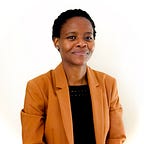#MeettheWomeninEnergySeries: Leaving no one behind, ensuring informal settlements communities have access to solar energy, meet Pamella Kolanisi
Pamella Kolanisi works with informal settlements in the Western Cape, South Africa ensuring they have interim access to clean energy while they wait for grid electricity. Pamella, a Solar Home Systems (SHS) Installer and Maintainer at The iShack Project, takes care of installations, operations and maintenance of Solar Home Systems in her community. The iShack Project (iShack) which is an organisation based in Stellenbosch, South Africa, is a social enterprise that provides pay-for-use solar electricity service to people living in informal settlements in South Africa. Pamella joined The iShack Project as a Trainee Agent which involved her providing training to new agents on how to install solar home systems.
Hi Pamella, thank you so much for agreeing to speak to me and sharing your journey in the energy sector.
Please tell us a little about yourself and your work at iShack.
My daily schedule involves working with other agents to provide services to our clients, working in the field fixing systems for our clients and sometimes I do installations.
Of the work you have done, what have been some of your standout moments?
It’s when we install solar home systems, and we see the smile on our clients’ faces because they are very happy. This makes me love my job more and more because a happy community is a healthy community. Also, one of the best things is training new agents and when you see them doing a good job in the field — it makes me feel good.
“…a happy community is a healthy community…”
In South Africa, most people want grid electricity aka “Eskom electricity”, for communities that currently do not have access to Eskom electricity, what would you say to them about solar home systems?
A solar home system is the best option while you wait for Eskom electricity than using paraffin and candles as those can cause more informal houses/‘shack’ fires. Solar home systems reduce shack fires because you have your lights, you can watch TV and you can charge your cell phone using the solar home system.
Part of your job is to train new Installers and Solar Agents, do people get surprised that they are being trained by women and are you seeing more women being solar installers?
When training new solar agents and installers they get surprised, but the most important thing is to sit them down and explain to them that if I can do it, they can also do it too. My gender should not get in the way, what is essential is the skills and knowledge that I can provide to the new agents. Women can be solar installers if they want to, they should not see this job as a man’s job.
“My gender should not get in the way, what is essential is the skills and knowledge that I can provide to the new agents.”
How is the COVID-19 impacting your work?
It has impacted my job because I must be extremely careful, and I cannot work without using Personal Protective Equipment (PPE). Also, with the new regulations in place to ensure everyone is safe, when I visit clients I have to ask them to go outside before I can get in and work inside their home.
What are some of the obstacles that you encounter in your work and how have you overcome them?
It is when you explain to clients that they must report any issues with their system to us and not try and fix the system themselves whenever they need maintenance. Sometimes when we go to check client systems for maintenance and see that the system has been tampered with, some clients can get aggressive. But I have learnt that I must always remain calm while I engage the client and trying to sort out the problem step by step with them.
For the benefit of government officials and policymakers in South Africa, can you tell them why we need off-grid solutions such as Solar Home Systems as part of the electrification plan?
We need solar home systems while people are waiting for Eskom electricity, this can reduce the level of protests of people fighting for service deliveries such as Eskom electricity. People can wait while they know that they have something better than using paraffin and candles because that can cause a lot of shack fires.
Looking into the future, what do you still hope to achieve and what changes do you expect to see happen in the energy sector?
I want to see the project spreading to every community that does not have Eskom electricity and adding more appliances that can work using a solar home system.
Finally, what key lessons have you learnt during your journey that you would like other women entering the field to know?
It is very important to trust yourself because people like to say we are doing a man’s job, but some men cannot do the solar installation job. Trust yourself enough and tell yourself that “I can do it”.
The Meet the Women in Energy Series features women in the energy sector who are committed to transforming the energy space. This series seeks to inspire other women and showcase the many talented women working in the sector ranging from entrepreneurs, experts, senior executives, middle managers to young professionals’ and new graduates.
Follow The iShack Project on Facebook and Twitter to keep up with their amazing work.
